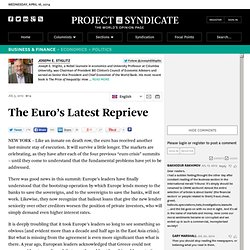

How to save the euro. By Cyrus Sanati FORTUNE -- The elections in France and Greece over the weekend have created a crisis of confidence that could eventually drown the euro and push the continent into a deeper recession.

Talk of tearing up past agreements and a return to profligate spending is not what Wall Street and the markets need to hear right now and will simply serve to encourage further capital flight out of the eurozone. All this uncertainty confirms that a more concrete solution to the euro crisis is needed, one that involves a much tighter economic union -- something that regrettably looks increasingly untenable. But before a permanent solution could ever possibly take root, market confidence needs to be restored to the eurozone. "Is Europe on a Cross of Gold?" by Barry Eichengreen. Exit from comment view mode.

Click to hide this space ROME – Increasingly, one hears predictions that the euro will go the way of the gold standard in the 1930’s. "The Euro’s Latest Reprieve" by Joseph E. Stiglitz. Exit from comment view mode.

Click to hide this space NEW YORK – Like an inmate on death row, the euro has received another last-minute stay of execution. The Value of European Currencies if the Euro Breaks Up, RealClearWorld - The Compass Blog. April 03, 2012 From a paper authored by Jens Nordvig and Nick Firoozye, an estimate of how European currencies would be valued following a break-up of the Eurozone.

Via Business Insider. (Click on the image for a larger picture.) A Tale of Two Currencies by Stefano Casertano. The Euro crisis resembles a Shakespearean tragedy: Despite the obvious deficiencies of the monetary union, all alternatives are decidedly worse for Germany.

The German idea of an exit from the Euro is gaining popular support. According to an “Emnid-Institut” poll, 56% of Germans would favor a return to the “Deutsche Mark,” the country’s old currency. The poll was ordered by “Bild,” a populist newspaper that periodically chastens (with bold headlines) politicians for helping out other EU countries in dire straits – hence, some may suspect the poll to be biased. But other prominent voices have also started to come out of the closet and now speak against the Euro. Europe is Not the United States - Martin Feldstein. Exit from comment view mode.

Click to hide this space CAMBRIDGE – Europe is now struggling with the inevitable adverse consequences of imposing a single currency on a very heterogeneous collection of countries. But the budget crisis in Greece and the risk of insolvency in Italy and Spain are just part of the problem caused by the single currency. The fragility of the major European banks, high unemployment rates, and the large intra-European trade imbalance (Germany’s $200 billion current-account surplus versus the combined $300 billion current-account deficit in the rest of the eurozone) also reflect the use of the euro. European politicians who insisted on introducing the euro in 1999 ignored the warnings of economists who predicted that a single currency for all of Europe would create serious problems. The Eurozone’s Fork in the Road - Mario I. Blejer and Eduardo Levy Yeyati. Exit from comment view mode.

Click to hide this space BUENOS AIRES – Many observers have recently declared that the eurozone debt crisis is practically resolved, or at least on hold for a few years. The Erosion of the EU. Understanding developments in the European crisis has become rather like Kremlinology, trying to figure out the meaning of subtle changes in wording and rearrangements of the Politburo on the podium for May Day parades.

One example is Mario Draghi of the European Central Bank (ECB). Sometimes the bank president suggests that he will do what nearly everyone else can see is necessary for the survival of the euro: print lots of them and use some to buy EU government debt, following the example of the Fed and the Bank of England. Does the Euro Have a Future? by George Soros. The euro crisis is a direct consequence of the crash of 2008.

When Lehman Brothers failed, the entire financial system started to collapse and had to be put on artificial life support. This took the form of substituting the sovereign credit of governments for the bank and other credit that had collapsed. At a memorable meeting of European finance ministers in November 2008, they guaranteed that no other financial institutions that are important to the workings of the financial system would be allowed to fail, and their example was followed by the United States. Angela Merkel then declared that the guarantee should be exercised by each European state individually, not by the European Union or the eurozone acting as a whole.
This sowed the seeds of the euro crisis because it revealed and activated a hidden weakness in the construction of the euro: the lack of a common treasury. Europe's currency crisis: How to save the euro. The Ticking Euro Bomb: What Options Are Left for the Common Currency? - SPIEGEL ONLINE - News - International. This is the final installment, comprising Parts 3 and 4 of SPIEGEL's recent cover story on the history of the common currency.

Be sure to read Part 1 and Part 2 as well. Act III: The Euro Crisis (2010/11) How Greece becomes a pawn in the hands of investors. How the European Central Bank goes astray. Why the world no longer makes sense to the Greeks. The Challenge for Mario Draghi at the European Central Bank. Central Bank Loans May Ease Europe’s Crisis. Yves Herman/Reuters Mario Draghi, the central bank's president, second from left, had resisted calls to stand directly behind debtor governments by buying their bonds as necessary, without limit. Though it is too soon to gauge any longer-term benefits, the move, by the , could be a turning point in the Continent’s — a cascading problem that for nearly two years has plagued financial markets around the world and now threatens global economic growth. American officials and global economists have long urged the Europe’s central bank to take just such an aggressive stance — even as European political leaders have repeatedly failed to devise concrete near-term plans to address Europe’s debt problems and deteriorating finances.
Carl B. Europe’s Next Nightmare - Dani Rodrik. Exit from comment view mode. Click to hide this space CAMBRIDGE – As if the economic ramifications of a full-blown Greek default were not terrifying enough, the political consequences could be far worse. A chaotic eurozone breakup would cause irreparable damage to the European integration project, the central pillar of Europe’s political stability since World War II. It would destabilize not only the highly-indebted European periphery, but also core countries like France and Germany, which have been the architects of that project. The nightmare scenario would also be a 1930’s-style victory for political extremism.
Free trade and the gold standard had required downplaying domestic priorities such as social reform, nation-building, and cultural reassertion. As my Harvard colleague Jeff Frieden has written, this paved the path for two distinct forms of extremism. Fortunately, fascism, communism, and other forms of dictatorships are passé today. Europe’s Last Best Chance - Michael Boskin. Exit from comment view mode. Click to hide this space STANFORD – The resignations of Greek Prime Minister George Papandreou and Italian Prime Minister Silvio Berlusconi have highlighted how Greece, Italy, and many other countries obscured for too long their bloated public sectors’ long-standing problems with unsustainable social-welfare benefits.
Indeed, for many of these countries, meaningful reform has now become unavoidable. The social-insurance systems in Europe, as in the United States, Japan, and elsewhere, were designed under vastly different economic and demographic circumstances – more rapid economic growth, rising populations, and lower life expectancy – from those prevailing today. Governments (the focus is on Greece and Italy at the moment, but they are not alone) have promised too much, to too many, for too long. Fiscal Union Cannot Save the Euro - Derek Thompson - Business. It might have five years ago. Or five years from now. Not right now. WFARBY/Flickr. The future of the EU: Two-speed Europe, or two Europes? What Can Save the Euro? - Joseph E. Stiglitz. Is the European Dream Over? - Ian Buruma.
The ECB Fear Factor - Philippe Legrain. Exit from comment view mode. Click to hide this space BRUSSELS – Panic is beginning to overwhelm the eurozone. Italy and Spain are caught in the maelstrom. Belgium is slipping into the danger zone. As France is dragged down, the widening gap between its bond yields and Germany’s is severely testing the political partnership that has driven six decades of European integration. Even strong swimmers such as Finland and the Netherlands are straining against the undertow. Left unchecked, this panic about sovereign solvency will prove self-fulfilling: just as a healthy bank can fail if it suffers a run, even the most creditworthy government is at risk if the market refuses to refinance its debt.
The Decline and Fall of the Euro? - Daniel Gros. Europe’s Dying Bank Model - Gene Frieda. Exit from comment view mode. Click to hide this space LONDON – The good news for Europe is that it will not reenact the dramatic collapse of Lehman Brothers. The European Central Bank’s unlimited ability to provide liquidity ensures that.
But European leaders have yet to recognize that old bank business models are obsolete, and that reliance on private-sector leverage for balance-sheet repair of both sovereigns and banks is doomed to failure. Two years into the crisis, the authorities have correctly identified four crucial problems – sovereign debt, bank capital, the risk of a Greek default, and deficient growth. In general, the eurozone has outsized banks (assets equivalent to 325% of GDP) that are highly leveraged (the 15 largest banks’ leverage is 28.9 times their equity capital). This model’s viability depends on large amounts of cheap leverage, supported by implicit government backing.
Higher levels of capital are required for two main reasons. Euro Struggles Can Be Traced to Origins of Common Currency. It was shortly before his departure to Brussels when the chancellor was overpowered by the sheer magnitude of the moment. Helmut Kohl said that the "weight of history" would become palpable on that weekend; the resolution to establish the monetary union, he said, was a reason for "joyful celebration.
" Soon afterwards, on May 2, 1998, Kohl and his counterparts reached a momentous decision. Eleven countries were to become part of the new European currency, including Germany, France, the Benelux countries -- and Italy. As European Austerity Ends, So Could the Euro. Keep the IMF Out of Europe - Mario I. Blejer and Eduardo Levy Yeyati. Winning the European Confidence Game - Raghuram Rajan. Why the euro needs Eurobonds: Hundreds of years of reasons. Simon Johnson: The End of the Euro: A Survivor's Guide. "The Euro Awaits Its Verdict" by Peter Boone and Simon Johnson. Europe, Heal Thyself - Daniel Gros. Disaster Can Wait - Barry Eichengreen. A Summit to the Death - Kevin O'Rourke. "Is the Euro Ending or Beginning?" by Jean Pisani-Ferry.
Deep Dive can europe be saved? Briefing: Can ecosystems show how to fix the euro? - science-in-society - 10 November 2011. "A Centerless Euro Cannot Hold" by Kenneth Rogoff. Why America Should Care About the Collapse of European Unity. "The next reserve currency" by Alexander Görlach.